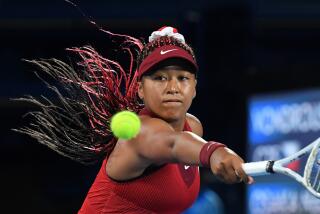Billie Jean King keeps her eye on the future of tennis in the U.S.
- Share via
She is 68 going on 40. Her name is Billie Jean King, and she still hints that a cure to all that ails her beloved sport of tennis can be found in how she did it.
“Leave your guts on the court,” she says, and she means in life, as well as tennis.
She comes to town this time of year to stir up a little interest in one of the loves of her life, her World Team Tennis league. It is in its 37th season, has a local team in the Orange County Breakers, tries to squeeze a season in between Wimbledon and the U.S. Open, and serves as a metaphor for who King was and always will be.
That would be a county-parks, holes-in-her-shoes, play-for-fun-till-the-sun-goes-down competitor. In everything she does, and every project she takes on, she is still trying to get her first serve in and is mad as hell when she doesn’t.
She’s about as corporate as Bubba Watson. When she talks about her World Team Tennis, she isn’t selling tickets, she’s setting examples and embracing concepts.
“Let’s say you talk to kids and they are playing lacrosse and tennis,” she says. “They talk about lacrosse, and they talk about team. Tennis? They talk about their lesson. If they have to choose one or the other, they’ll choose the team. They get a uniform. They get to be part of something with other kids. Tennis needs to stress teams. Get rid of the word ‘lesson.’ Call the teachers coaches, not tennis pros.”
She was addressing the current sorry state of United States professional tennis.
The French Open is about to begin. Wimbledon will follow quickly, as will the every-four-years pseudo major, the Olympics, to be played on the same hallowed grounds at the All England Lawn Tennis Club.
During that time, if all goes as it has for tennis players from the good ol’ USA, you will hear 50 tennis commentators ask the same question 500 times: What’s wrong with U.S. tennis? (Actually, they’ll ask what’s wrong with American tennis, letting their provincial arrogance smugly eliminate the existence of an entire continent containing the likes of Brazil and Argentina.)
The most recent U.S. male to win one of the four major tournaments was Andy Roddick. That was the 2003 U.S. Open. If you omit Serena and Venus Williams, who have won plenty, the last U.S. female to win one of those was Jennifer Capriati in the 2002 Australian.
Serena is still fighting the good fight, is back up to No. 5 in the world and may continue to be an asterisk to that U.S. tennis conversation for a few more years. Venus has slipped to No. 52 and has battled illness and injury of late. She will be 32 in June, Serena 31 in September.
“Serena is fit again,” King says. “The more she plays, the better she gets.”
King likes the emergence of John Isner on the men’s side too.
“He goes four years to college, and then he comes out and does what he has done,” she says. “That’s a good example to set.”
Still, there is no question, with the Williams sisters near the end and the highest ranking U.S. male singles player Mardy Fish — age 30 and No. 10, a notch above Isner — that we are not living the era of McEnroe and Connors, or Sampras and Agassi, or Evert and Navratilova.
King agrees that tennis is a global sport, and as such, you don’t have to be Spanish to admire Rafael Nadal or Russian to pull for Maria Sharapova. But she also agrees that Europe is driving the bus in the sport now, and the future, post Williams sisters, appears to offer mostly more passengers from our 50 states.
She admits to having no earthshaking resolution to the problem but tries to see the glass as half full as possible.
“I remember thinking we’d never see another Pete Sampras,” she says. “And then Roger Federer beat him at Wimbledon. I didn’t see it coming, and suddenly, there he was.
“We need to get the best athletes for tennis, but we don’t. They play basketball or even soccer. You can’t even use your hands. That drives me nuts.
“We need champions. Those are people who hate to lose more than they like to win.”
Coincidentally, two events have taken place recently that might hint at an answer to those looking for upcoming U.S. tennis prominence.
On Tuesday in Georgia, while USC won its fourth straight NCAA men’s title, its No. 1 player, Steve Johnson, ran his winning singles streak to 66. And Thursday, Pat McEnroe, head of the U.S. Tennis Assn.’s player development program, held a conference call to acquaint the media with 16-year-old Taylor Townsend, who won the junior girls’ titles in singles and doubles at this year’s Australian Open.
King went from the public courts of Long Beach to the public adoration that comes with winning 12 Grand Slam singles titles, 16 Grand Slam women’s doubles titles and 11 Grand Slam mixed doubles titles. Also, Sept. 20 of next year, she will celebrate the 40th anniversary of beating Bobby Riggs in the Houston Astrodome and sending male chauvinism into a spiral.
She has seen it all and wants more.
“Just give us your best athletes,” she says of tennis, “and we’ll give them a great life.”
More to Read
Go beyond the scoreboard
Get the latest on L.A.'s teams in the daily Sports Report newsletter.
You may occasionally receive promotional content from the Los Angeles Times.











